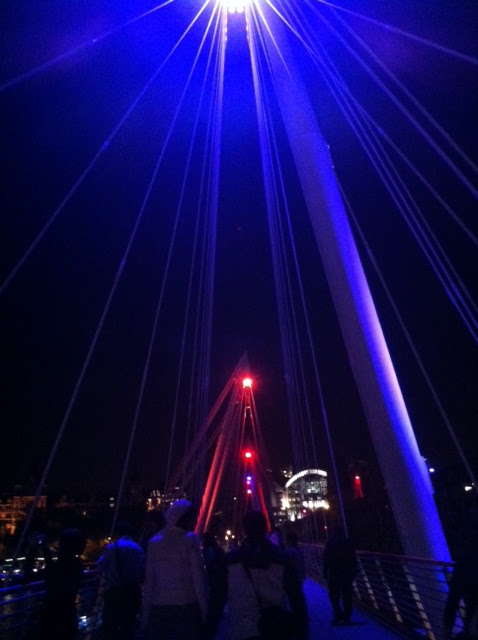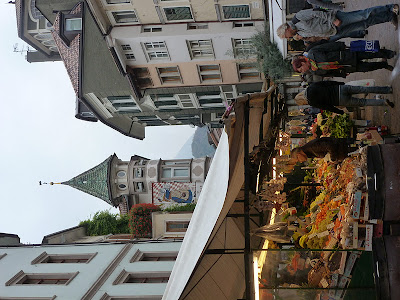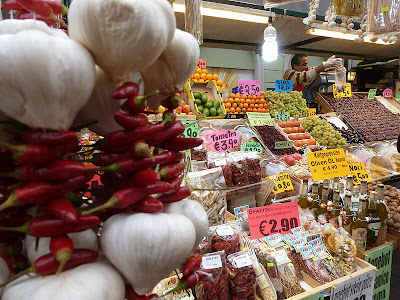for years i think it was a mixture of wariness and dread—a
mild dread, but dread nonetheless—yes, those two things, that affected my whole notion of cruise on a monolithic cruise ship.
i was uncomfortable with the thought of being stuck onboard a vessel hundreds of miles out on the ocean with 2000 strangers. i was unnerved by what i perceived in my own (
mostly imagined) version of the cruising demographic (
mostly based on food orgies, attire, and level of drunkenness, instead of the usual age, sex, and income level): vacant-eyed, rum-guzzling gamblers under the hypnotic spell of slot machines and blackjack tables, white-haired folks (god love 'em cuz i'll be one soon enough) with tall white sport socks rising stoically out of tidy white sneakers (white hair is fine but, dammit, i refuse to put on this footwear as part of my twilight years fashion ensemble), people whose pot bellies tried to remain politely contained but instead willfully cascaded over high-waisted pants, and those travelers with a kooky love for nonstop eating in general and ice-sculpture brunch buffets in particular.
it all started last year. we bid on a cruise at a charity auction, never really intending to be the highest bidder, only meaning to have some fun and to raise money for a good cause, but then, before i knew exactly what was happening, the auctioneer called out "SOLD" and pointed in our direction. it was a done deal.
suddenly i was going on a cruise to the caribbean.
i know that most people would jump at the chance to sail in the warm turquoise waters past cuba and around jamaica and the grand cayman islands, and i know, had i written this before i left, that if i had told you that as the date of our embarkation approached i began to get a little nervous, you would have said to yourselves as you read this
how can she be such an ungrateful wretch? she should stop being ridiculous and just have a good time.
exactly. i could hear you saying those words, i had a premonition about those words, so that's what i did. i listened to you. i went on a cruise and had a good time, just like you said, and i lived to tell my tale.
but before i go and have that good time that i'll tell you about soon (let's pretend it's still a few weeks ago), i have to get something off my chest, so to speak. i must confess something embarrassing to you, the real reason i balked at going on a cruise all along. confession #1: i hate crowds. i'm talking about the kind of crowds at the mall on a rainy saturday (you'll never find me there), the crowds in subways during rush hour, the crowds in touristy gathering spots like times square on new years eve (nor there either) and the all-day crowds on the piazza del campo in sienna (i survived), and the kind of crowds i envisioned on a giant cruise ship. confession #2: it's embarrassing, but i can get physically ill in dense, surging masses of humanity that press against me—my skins crawls, my palms start to sweat, my heart races, i feel headachy, nauseous and dizzy.
there. i've said it. i feel so much better now that i've unburdened myself.
as it turns out, i needn't have been concerned about crowds in the first place. the ship was huge and obviously,
obviously—look at how i can toss out that word "obviously"with confidence and reckless abandon now that i've returned—the 2000 people were easily dispersed over all that square footage on deck after deck after deck. only the pool area was mobbed, but even the pool was okay when gobs of people debarked for excursions in the ports of call.
we walked around in town and then jumped back on the tender hours before we were due to set sail again to take advantage of the uncrowded atmosphere, to relax and listen to the live steel drum music onboard.
and the real demographic of the cruise? a pleasant mix of older folks, those in the middle aged 45 to 60-ish (that's me in the middle of the middle age demographic), trendy young people, and families.
as for the conclusions i drew from my own unofficial demographic, i can sum them up easily enough—my fellow shipmates dressed very nicely. i didn't notice any long, white tube socks paired with white sneakers—no, not even on those glassy-eyed, vacantly-staring gamblers. i couldn't help observing, however, the extreme popularity of the over-the-top ice-sculpture brunch buffet as i walked from table to table laden with platters of mouth-watering goodies (i've never seen so many different salads, meats, fish and desserts in one place) and happily filled my own plate sky high.
it was a wonderful trip and the millennium is a beautiful ship.
~ i'm back on dry land again at home in freeport and i am shaking my head and wondering about my imagined fear of cruising. coming up: more on cruising—stuff you won't find in travel brochures.




































